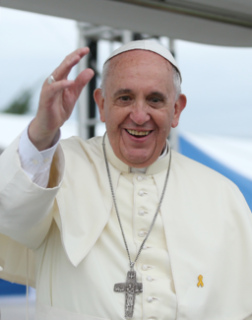Synodality
Monday 23rd October 2023
Bishop Jorge Mario Bergoglio, in a sermon before his election as Pope, quoting Rev. 3:20 and the image of Jesus standing at the door and knocking, said this: “Today Jesus knocks from the other side, from inside the Church – he wants to go out and we must follow him. He wants to go first of all to all the marginalised, to those on the margins of society and the Church, to the poor, the exploited. He goes where people are hurting. The Church is to be a field hospital where wounds – physical, social, psychological, and spiritual – are dressed and healed.”

Such a statement would be fairly well received by most of us. It’s in line with the sort of notion we have about how the Church should express itself in the modern world. But to read or hear that from a Roman Catholic bishop might be just a little surprising.
The Roman Catholic Church is being led down an unfamiliar street by Pope Francis. I don’t claim to follow all the turns and twists of this road, but I do recognise that it is not “a road well travelled.“ As an Anglican (“lapsed” now into the URC!) I am well used to creeds and forms of service that haven’t changed in decades, even centuries, and I’m also aware of the sharp differences in practice and understanding that go with being catholic or evangelical Anglicans.
Reading The Tablet – a well-informed - and in the best sense, critical – weekly Roman Catholic paper, I get the impression that Pope Francis is keen to share some of the leadership of the Church, at present heavily vested in the bishops, with the laity. Over the last couple of years he has instituted a process of praying, listening, dialoguing and discerning under the title of Synodality. The XVI Ordinary General Assembly of the Synod of Bishops taking place this month continues this process, with every diocese of the Church being engaged in the preparatory work.
This whole process has the capacity to make significant changes to the way the Roman Catholic Church continues its life and mission. But there is also the possibility of derailment, since there is strong opposition from some bishops across the world. Could it be, perhaps, that some of them fear the loss of power and prestige? Pope Francis is surely one of the most humble of Church leaders, and is certainly aware of the significance of these momentous discussions.
All Churches run the risk of remaining or becoming patriarchal, hierarchical and over-clerical. We need to rediscover what it means to be the People of God (from a letter in this week’s Tablet).
Some of the spark has gone out of the Ecumenical Movement, once a formative process of recognition and acceptance between the various denominations. We Protestants might do well to remember the energy that went into inter-Church conversations in the sixties and seventies, and offer our prayerful support to those in the world-wide Roman Catholic Church at this time of upheaval and reform.
Image: "Pope Francis South Korea 2014" by Korea.net / Korean Culture and Information Service (Jeon Han) is licensed under CC BY-SA 2.0.


Comments